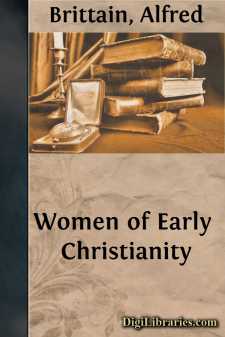Categories
- Antiques & Collectibles 13
- Architecture 36
- Art 48
- Bibles 22
- Biography & Autobiography 813
- Body, Mind & Spirit 142
- Business & Economics 28
- Children's Books 17
- Children's Fiction 14
- Computers 4
- Cooking 94
- Crafts & Hobbies 4
- Drama 346
- Education 46
- Family & Relationships 57
- Fiction 11829
- Games 19
- Gardening 17
- Health & Fitness 34
- History 1377
- House & Home 1
- Humor 147
- Juvenile Fiction 1873
- Juvenile Nonfiction 202
- Language Arts & Disciplines 88
- Law 16
- Literary Collections 686
- Literary Criticism 179
- Mathematics 13
- Medical 41
- Music 40
- Nature 179
- Non-Classifiable 1768
- Performing Arts 7
- Periodicals 1453
- Philosophy 64
- Photography 2
- Poetry 896
- Political Science 203
- Psychology 42
- Reference 154
- Religion 513
- Science 126
- Self-Help 84
- Social Science 81
- Sports & Recreation 34
- Study Aids 3
- Technology & Engineering 59
- Transportation 23
- Travel 463
- True Crime 29
Roman Women
by: Alfred Brittain
Description:
Excerpt
THE WOMAN OF LEGENDARY ROME
The conditions which governed the life of woman in the earliest days of Roman history are too far removed from the searchlight of historical investigation for us to essay to indicate them with any degree of fulness and accuracy of detail. While it is true that the ancient writers have bequeathed to us records of historic events from the very founding of their nation, the source of their information is very questionable and its authenticity extremely doubtful. Rome did not cultivate literature until very late in her history; she was too greatly preoccupied in her rôle of conquering the world. At a time when every Greek was acquainted with the noblest poetry produced by his gifted race, Rome had not produced a single writer whose name has been preserved. And if at that time she had possessed any men of letters, it is quite certain that there were few of her citizens who would have been able to read their works. Hence, when the first attempt was made to write her history, the authors depended principally for their material on traditions and legends which, as is the case with all such lore, had gained greatly in marvellousness at the expense of historical value. In addition to these sources, it is probable that during the early centuries annals were kept of the principal happenings in the State. According to Cicero, they were written at the end of each year by the high priest. These records were used by the first historians; and it is likely that the latter were not so greatly restrained, by their literary conscience, from enlarging on the material, as they were tempted, according to the power of their imagination, to present a picture both interesting and satisfactory to the national pride. In many cases, as where the exact words of their characters are reported, the ancient historians evidently deemed that any deficiencies in the matter of proof were abundantly atoned for by the explicitness of the information given.
As to the historical value of legends, that is a question upon which modern writers are inclined to disagree. Since the inauguration of the higher criticism, it has been the fashion for extremists entirely to disown any belief in the dramatis personæ of ancient traditions. They claim that the names and the actions thus celebrated usually represent natural forces and historic evolutions; though, to the ordinary student, this would seem to require a remarkable amount of poetic inventiveness on the part of an undeveloped people. Moreover, it is not, perhaps, without reason that the student often looks upon the manner in which modern scholars reject the traditional contributions of the old historians as being a little arbitrary. What traveller has not found his patience sorely tried, while viewing with reverence the reputed site of some heroic or sacred occurrence of far-off days, as he recalled to memory the fact that the latest authorities hold that, while the thing might have taken place a few miles to the east or a short distance to the north, it, for certain erudite but unconvincing reasons, could not possibly have occurred on the spot where it has been located by the continuous belief of centuries...?



